Module 9 Great inventions Unit 3 Language in use课件(共55张PPT)
文档属性
| 名称 | Module 9 Great inventions Unit 3 Language in use课件(共55张PPT) | 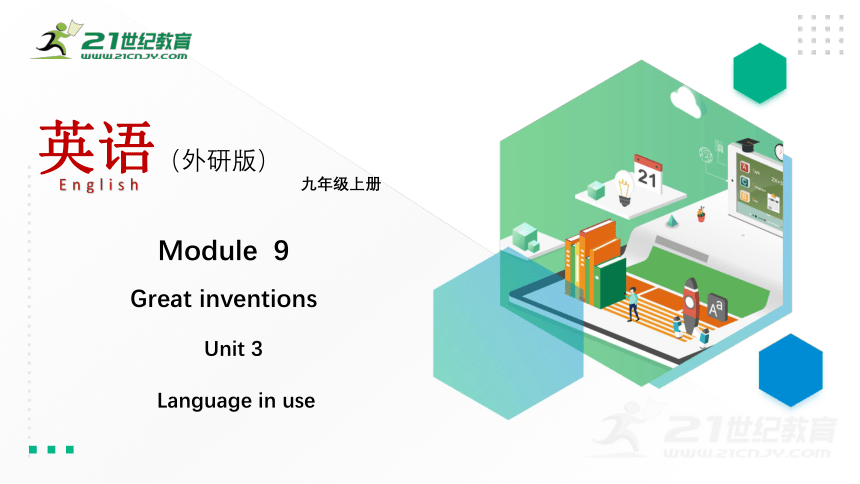 | |
| 格式 | pptx | ||
| 文件大小 | 28.3MB | ||
| 资源类型 | 试卷 | ||
| 版本资源 | 外研版 | ||
| 科目 | 英语 | ||
| 更新时间 | 2021-10-11 13:52:56 | ||
图片预览

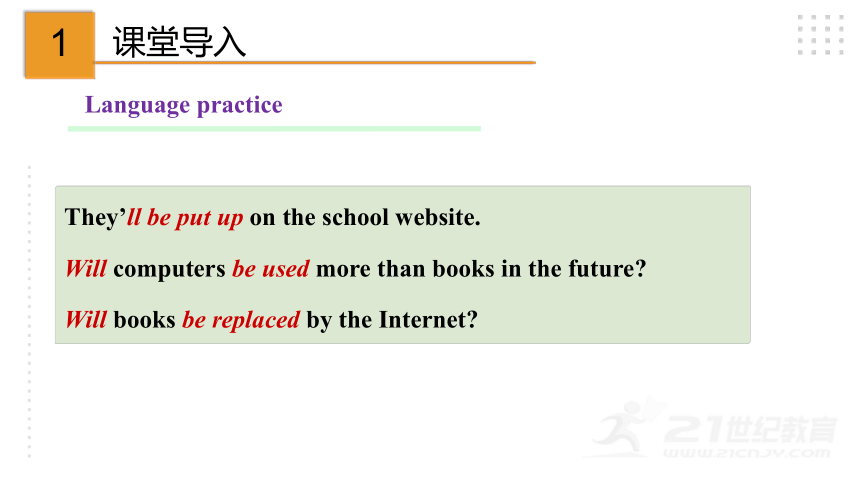
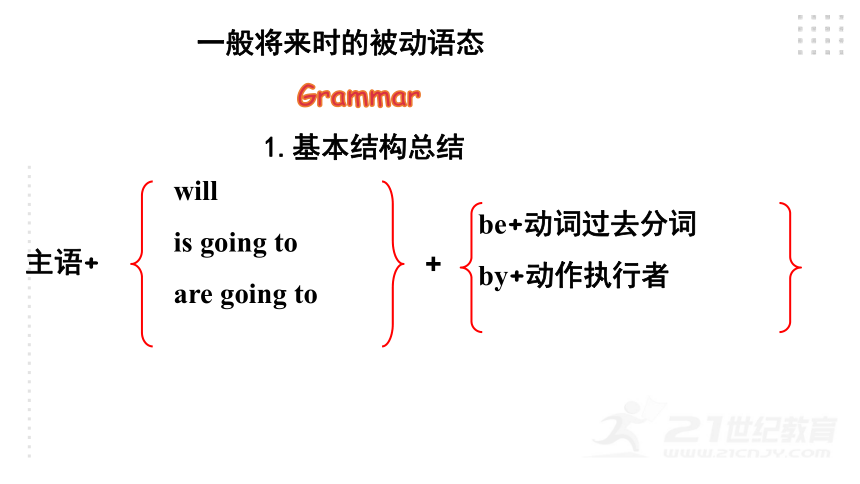

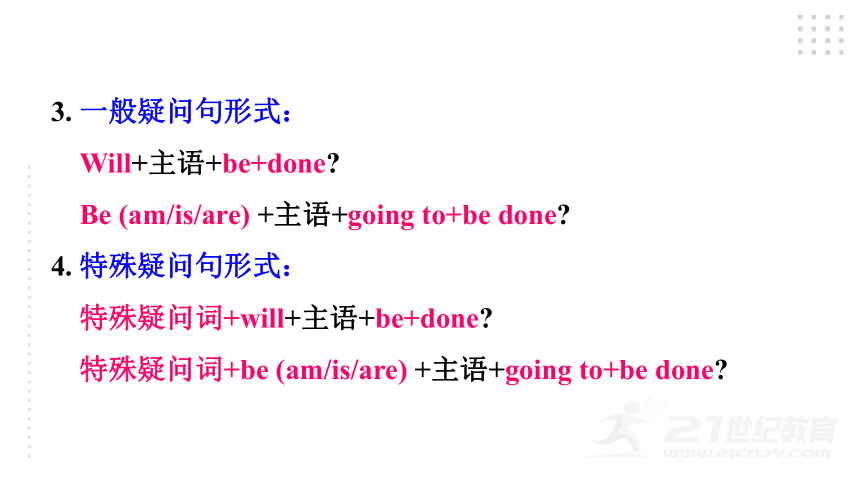


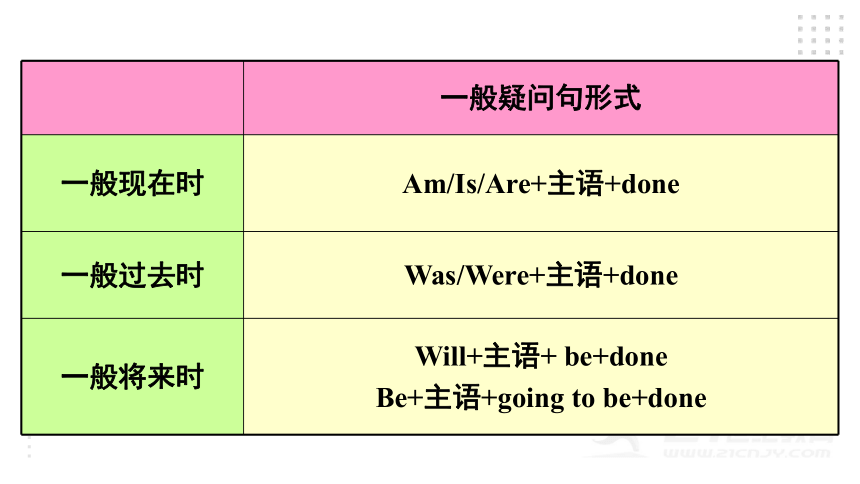

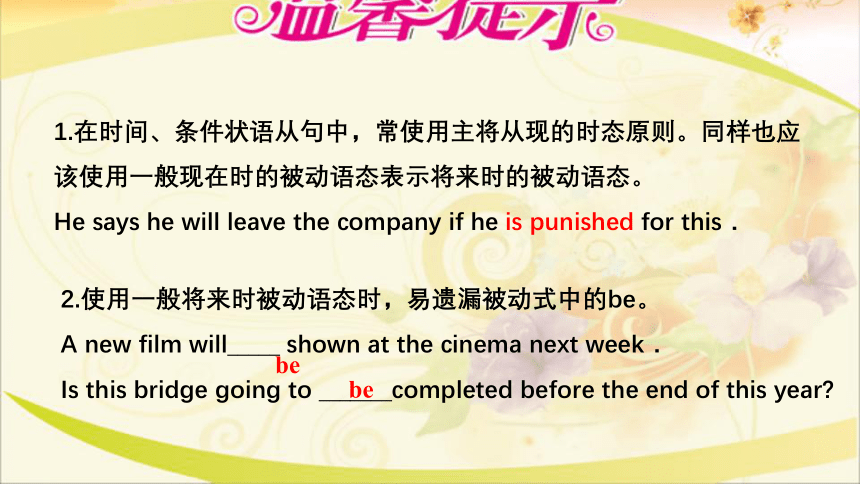
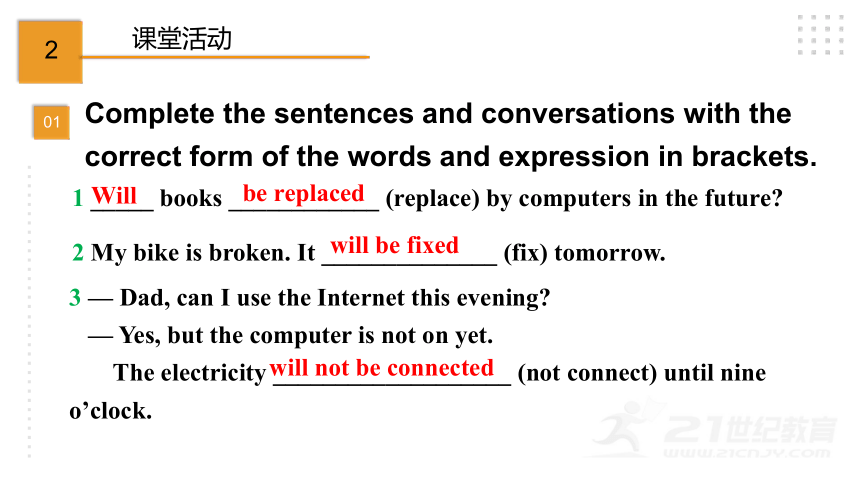
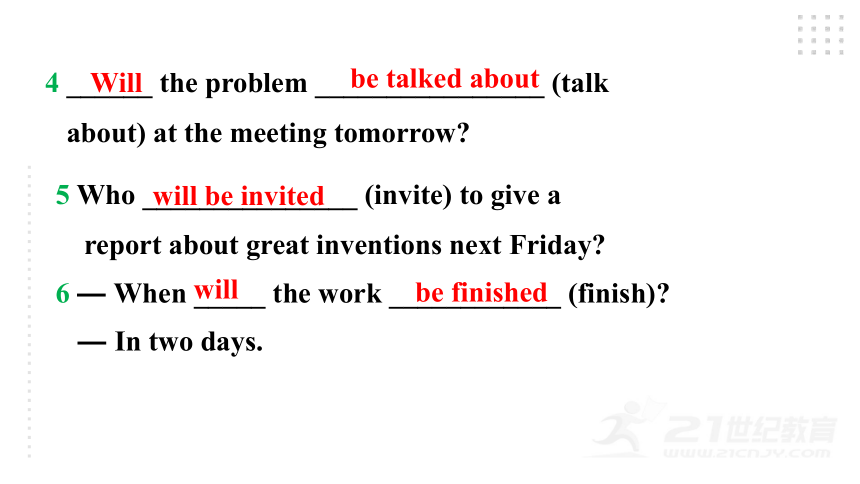
文档简介
(共55张PPT)
英语(外研版)
九年级上册
English
Module 9
Great inventions
Unit 3
Language in use
They’ll be put up on the school website.
Will computers be used more than books in the future
Will books be replaced by the Internet
Language practice
1
课堂导入
1.基本结构总结
主语+
will
is going to
are going to
+
be+动词过去分词
by+动作执行者
一般将来时的被动语态
Grammar
1. 肯定句形式:
主语+ will/be (am/is/are) going to+be+done
2. 否定句形式:
主语+ will not/be (am/is/are) not going to + be+done
1.各类句式
3. 一般疑问句形式:
Will+主语+be+done
Be (am/is/are) +主语+going to+be done
4. 特殊疑问句形式:
特殊疑问词+will+主语+be+done
特殊疑问词+be (am/is/are) +主语+going to+be done
3、被动语态用法总结
格式 主动语态 被动语态
一般现在时 do/does am/is are+done
一般过去时 did was/were+done
一般将来时 will/be going to do will be/be going to be+done
肯定句形式 否定句形式
一般现在时 主语+am/is/are+done 主语+am/is/are+
not+done
一般过去时 主语+was/were+done 主语+was/were+
not+done
一般将来时 主语+will be/be going to be +done 主语+will not be/be not going to+be+done
一般疑问句形式
一般现在时 Am/Is/Are+主语+done
一般过去时 Was/Were+主语+done
一般将来时 Will+主语+ be+done
Be+主语+going to be+done
特殊疑问句形式
一般现在时 特殊疑问词+am/is/are+主语+done
一般过去时 特殊疑问词+was/were+
主语+done
一般将来时 特殊疑问词+will+主语+be+done
特殊疑问词+be+主语+going to be+done
be
be
1.在时间、条件状语从句中,常使用主将从现的时态原则。同样也应该使用一般现在时的被动语态表示将来时的被动语态。
He says he will leave the company if he is punished for this.
2.使用一般将来时被动语态时,易遗漏被动式中的be。
A new film will_____ shown at the cinema next week.
Is this bridge going to _______completed before the end of this year
Complete the sentences and conversations with the correct form of the words and expression in brackets.
1 _____ books ____________ (replace) by computers in the future
2 My bike is broken. It ______________ (fix) tomorrow.
Will
be replaced
will be fixed
2
课堂活动
01
3 — Dad, can I use the Internet this evening
— Yes, but the computer is not on yet.
The electricity ___________________ (not connect) until nine o’clock.
will not be connected
4 ______ the problem ________________ (talk
about) at the meeting tomorrow
Will
be talked about
5 Who _______________ (invite) to give a
report about great inventions next Friday
6 — When _____ the work ____________ (finish)
— In two days.
will be invited
will
be finished
Look at the pictures and describe the new classroom that will be built. Use the words in the box to help you.
A new classroom will be built.
build buy change
02
Possible answers
A new floor will be built.
New furniture/desks/chairs will be bought.
A new blackboard will be bought.
A new interactive whiteboard will be bought.
The windows and the door will be changed.
The teacher's desk will be painted.
The lights will be changed.
The colour of the walls will be changed.
The walls will be fixed.
Work in pairs. Ask and answer questions about these great inventions.
a
1875
America
Alexander Graham Bell
03
1903
America
Wright Brothers
b
1924
Britain
John Logie Baird
c
A: When was the telephone invented
B: It was invented in 1875.
…
A: What kind of telephone do you
think will be made in the future
B: …
Complete the sentences with the words in the box.
direction introduction spread trade
1 Before the ____________ of printing, few people could read.
2 There were more books to sell, so the _______ in books grew.
introduction
trade
3 Because more people could read, ideas ________ quickly.
4 What _________ will printing take in the future
spread
direction
04
Listen and find out where the speaker is.
a) In a school library.
b) In the British Library.
c) In the British Museum.
05
Tapescript
After printing was invented, knowledge was spread around the world by books. For many years, books were very expensive. Each one was written by hand, so very few books were produced. Today, books are produced quickly. They’re light, cheap and easy to get hold of.
But the early books are now too valuable to be picked up and held in the hand, so here in the British Library, they were copied onto a computer a few years ago. Have a look at the screen here. You can turn the pages on the screen, without touching the real books.
1 Why were so few books produced in ancient times
2 Why were many old books copied onto a computer
Listen again and answer the questions.
Because they were written by hand.
They are too valuable to be picked up and held in the hand.
06
3 How has the computer helped people read old books in
the British Library
Old books were copied onto a computer a few years ago for people to be able to read them without touching them.
Read the passage and choose the best title.
The history of the Internet
The World Wide Web
The Internet and the Web
The future of the Internet
√
07
The Internet has been around for many years, but it was the invention of the World Wide Web that made it really useful to people. Together, the Internet and the World Wide Web have changed the world.
It was that...强调句型
The Internet was invented by the US government in the 1960s, for the army to use. In the 1970s, scientists and businesspeople also wanted to use the Internet to send and receive messages. For some years, people could only send very simple texts. They could not send photos or documents by the Internet.
发送和接收信息
That changed in 1991, when a British scientist named Tim Berners-Lee invented the World Wide Web. The World Wide Web allows people to send various types of files, such as texts, photos and videos by the Internet, so more and more people started to use it in the 1990s.
例如
Today, the Web has hundreds of millions of users. It has changed the way people live, work and play. Through the Internet, email allows us to communicate nearly instantly with people thousands of miles away. People and businesses use e-commerce and online shopping to buy and sell things across the world.
数百;成百上千;许许多多…
The Web also makes people's lives easier because now many things can be done from home, twenty-four hours a day. The Web can help you do research for your homework, so that you do not need to go to the library. You can use Internet banking, instead of going to the bank. And, of course, people just “surf the Web” when they want to relax.
Technology changes quickly, and it is hard to imagine what the future of the Internet and the Web will be. But it seems impossible to imagine life without them.
Now complete the chart.
Now complete the chart.
the Internet
was invented
In the 1960s
people can send
very simple texts
In the 1970s
the World Wide
Web was invented
More and more people
started to use Web
the Web changes
the way people live
In 1991
In the 1990s
Today
Read the passage and answer the
questions.
1. When was the Internet invented by the US government
2. What could people only send at first
In the 1960s.
They could only send very simple texts.
3. Who invented the World Wide Web in 1991
4. Can people use e-commerce and online
shopping to buy and sell things
A British scientist named Tim Berners-Lee.
Yes, they can.
What will the inventions of the future be like
mobile phone in the future
robot waiters
pad in the future
E-toilet
food in a pill
computer in the future
swimming car
flying suit
video newspaper
underwater city
air-conditioned suit
jet pack
E-books
Just as email has changed the way
we write to each other, e-books are
changing the way we read. We can
easily download new e-books from the
Internet. It is much easier and quicker to search for passages now, and we can also write notes in an e-book. What is more, they save a lot of paper. But e-book readers are still more expensive than paper books, so not all people can afford them. However, with the rapid development of electronic technology, reading e-books will become cheaper and cheaper. A lot of people think there will be more e-books than paper books in the near future.
Module task: Discussing inventions
Work in groups. Prepare for your discussion.
Think of an invention that has changed your life.
Make notes about the invention:
1 What is it
2 Why is it useful
Research how the invention has been developed
and make notes about what you find out.
08
Discuss with your group.
Tell your group about the invention.
Ask them for their ideas.
Make notes about your discussions.
09
Present your findings to the class.
09
3
课堂小结
1. We have learned future simple passive.
2. We have learned to write simple passage using future simple passive.
1. 在20世纪60年代 ;
2. (不)允许某人做某事 ;
3. 越来越多的 ;
4. 和某人交流/交谈/联系 ;
5. 做研究 ;
6. 目的是;以便;为了 ;
7. 代替;而不是 ;
8. 搜索;寻找 ;
9. 而且,更重要的是 ;
10. 并非所有的 。
in the 1960s
allow sb. (not) to do sth.
more and more
communicate with sb.
do research
so that
instead of
search for
what is more
not all
翻译下列短语
4
课堂练习
一、用括号内所给词的适当形式填空。
1.Bad news! The bank refused _______ (lend) us money.
2.Mrs Brown doesn’t go out much _____ (main) because she has to take care of her children.
3. Now the government is encouraging the ____________ (develop) of small businesses.
4.Believe it or not! If you tell John the secret,he ____________ (spread) it around the school.
5.My dad ________ (fix) my watch in the living room at the moment.
development
to lend
mainly
is fixing
will spread
https://www.21cnjy.com/help/help_extract.php
英语(外研版)
九年级上册
English
Module 9
Great inventions
Unit 3
Language in use
They’ll be put up on the school website.
Will computers be used more than books in the future
Will books be replaced by the Internet
Language practice
1
课堂导入
1.基本结构总结
主语+
will
is going to
are going to
+
be+动词过去分词
by+动作执行者
一般将来时的被动语态
Grammar
1. 肯定句形式:
主语+ will/be (am/is/are) going to+be+done
2. 否定句形式:
主语+ will not/be (am/is/are) not going to + be+done
1.各类句式
3. 一般疑问句形式:
Will+主语+be+done
Be (am/is/are) +主语+going to+be done
4. 特殊疑问句形式:
特殊疑问词+will+主语+be+done
特殊疑问词+be (am/is/are) +主语+going to+be done
3、被动语态用法总结
格式 主动语态 被动语态
一般现在时 do/does am/is are+done
一般过去时 did was/were+done
一般将来时 will/be going to do will be/be going to be+done
肯定句形式 否定句形式
一般现在时 主语+am/is/are+done 主语+am/is/are+
not+done
一般过去时 主语+was/were+done 主语+was/were+
not+done
一般将来时 主语+will be/be going to be +done 主语+will not be/be not going to+be+done
一般疑问句形式
一般现在时 Am/Is/Are+主语+done
一般过去时 Was/Were+主语+done
一般将来时 Will+主语+ be+done
Be+主语+going to be+done
特殊疑问句形式
一般现在时 特殊疑问词+am/is/are+主语+done
一般过去时 特殊疑问词+was/were+
主语+done
一般将来时 特殊疑问词+will+主语+be+done
特殊疑问词+be+主语+going to be+done
be
be
1.在时间、条件状语从句中,常使用主将从现的时态原则。同样也应该使用一般现在时的被动语态表示将来时的被动语态。
He says he will leave the company if he is punished for this.
2.使用一般将来时被动语态时,易遗漏被动式中的be。
A new film will_____ shown at the cinema next week.
Is this bridge going to _______completed before the end of this year
Complete the sentences and conversations with the correct form of the words and expression in brackets.
1 _____ books ____________ (replace) by computers in the future
2 My bike is broken. It ______________ (fix) tomorrow.
Will
be replaced
will be fixed
2
课堂活动
01
3 — Dad, can I use the Internet this evening
— Yes, but the computer is not on yet.
The electricity ___________________ (not connect) until nine o’clock.
will not be connected
4 ______ the problem ________________ (talk
about) at the meeting tomorrow
Will
be talked about
5 Who _______________ (invite) to give a
report about great inventions next Friday
6 — When _____ the work ____________ (finish)
— In two days.
will be invited
will
be finished
Look at the pictures and describe the new classroom that will be built. Use the words in the box to help you.
A new classroom will be built.
build buy change
02
Possible answers
A new floor will be built.
New furniture/desks/chairs will be bought.
A new blackboard will be bought.
A new interactive whiteboard will be bought.
The windows and the door will be changed.
The teacher's desk will be painted.
The lights will be changed.
The colour of the walls will be changed.
The walls will be fixed.
Work in pairs. Ask and answer questions about these great inventions.
a
1875
America
Alexander Graham Bell
03
1903
America
Wright Brothers
b
1924
Britain
John Logie Baird
c
A: When was the telephone invented
B: It was invented in 1875.
…
A: What kind of telephone do you
think will be made in the future
B: …
Complete the sentences with the words in the box.
direction introduction spread trade
1 Before the ____________ of printing, few people could read.
2 There were more books to sell, so the _______ in books grew.
introduction
trade
3 Because more people could read, ideas ________ quickly.
4 What _________ will printing take in the future
spread
direction
04
Listen and find out where the speaker is.
a) In a school library.
b) In the British Library.
c) In the British Museum.
05
Tapescript
After printing was invented, knowledge was spread around the world by books. For many years, books were very expensive. Each one was written by hand, so very few books were produced. Today, books are produced quickly. They’re light, cheap and easy to get hold of.
But the early books are now too valuable to be picked up and held in the hand, so here in the British Library, they were copied onto a computer a few years ago. Have a look at the screen here. You can turn the pages on the screen, without touching the real books.
1 Why were so few books produced in ancient times
2 Why were many old books copied onto a computer
Listen again and answer the questions.
Because they were written by hand.
They are too valuable to be picked up and held in the hand.
06
3 How has the computer helped people read old books in
the British Library
Old books were copied onto a computer a few years ago for people to be able to read them without touching them.
Read the passage and choose the best title.
The history of the Internet
The World Wide Web
The Internet and the Web
The future of the Internet
√
07
The Internet has been around for many years, but it was the invention of the World Wide Web that made it really useful to people. Together, the Internet and the World Wide Web have changed the world.
It was that...强调句型
The Internet was invented by the US government in the 1960s, for the army to use. In the 1970s, scientists and businesspeople also wanted to use the Internet to send and receive messages. For some years, people could only send very simple texts. They could not send photos or documents by the Internet.
发送和接收信息
That changed in 1991, when a British scientist named Tim Berners-Lee invented the World Wide Web. The World Wide Web allows people to send various types of files, such as texts, photos and videos by the Internet, so more and more people started to use it in the 1990s.
例如
Today, the Web has hundreds of millions of users. It has changed the way people live, work and play. Through the Internet, email allows us to communicate nearly instantly with people thousands of miles away. People and businesses use e-commerce and online shopping to buy and sell things across the world.
数百;成百上千;许许多多…
The Web also makes people's lives easier because now many things can be done from home, twenty-four hours a day. The Web can help you do research for your homework, so that you do not need to go to the library. You can use Internet banking, instead of going to the bank. And, of course, people just “surf the Web” when they want to relax.
Technology changes quickly, and it is hard to imagine what the future of the Internet and the Web will be. But it seems impossible to imagine life without them.
Now complete the chart.
Now complete the chart.
the Internet
was invented
In the 1960s
people can send
very simple texts
In the 1970s
the World Wide
Web was invented
More and more people
started to use Web
the Web changes
the way people live
In 1991
In the 1990s
Today
Read the passage and answer the
questions.
1. When was the Internet invented by the US government
2. What could people only send at first
In the 1960s.
They could only send very simple texts.
3. Who invented the World Wide Web in 1991
4. Can people use e-commerce and online
shopping to buy and sell things
A British scientist named Tim Berners-Lee.
Yes, they can.
What will the inventions of the future be like
mobile phone in the future
robot waiters
pad in the future
E-toilet
food in a pill
computer in the future
swimming car
flying suit
video newspaper
underwater city
air-conditioned suit
jet pack
E-books
Just as email has changed the way
we write to each other, e-books are
changing the way we read. We can
easily download new e-books from the
Internet. It is much easier and quicker to search for passages now, and we can also write notes in an e-book. What is more, they save a lot of paper. But e-book readers are still more expensive than paper books, so not all people can afford them. However, with the rapid development of electronic technology, reading e-books will become cheaper and cheaper. A lot of people think there will be more e-books than paper books in the near future.
Module task: Discussing inventions
Work in groups. Prepare for your discussion.
Think of an invention that has changed your life.
Make notes about the invention:
1 What is it
2 Why is it useful
Research how the invention has been developed
and make notes about what you find out.
08
Discuss with your group.
Tell your group about the invention.
Ask them for their ideas.
Make notes about your discussions.
09
Present your findings to the class.
09
3
课堂小结
1. We have learned future simple passive.
2. We have learned to write simple passage using future simple passive.
1. 在20世纪60年代 ;
2. (不)允许某人做某事 ;
3. 越来越多的 ;
4. 和某人交流/交谈/联系 ;
5. 做研究 ;
6. 目的是;以便;为了 ;
7. 代替;而不是 ;
8. 搜索;寻找 ;
9. 而且,更重要的是 ;
10. 并非所有的 。
in the 1960s
allow sb. (not) to do sth.
more and more
communicate with sb.
do research
so that
instead of
search for
what is more
not all
翻译下列短语
4
课堂练习
一、用括号内所给词的适当形式填空。
1.Bad news! The bank refused _______ (lend) us money.
2.Mrs Brown doesn’t go out much _____ (main) because she has to take care of her children.
3. Now the government is encouraging the ____________ (develop) of small businesses.
4.Believe it or not! If you tell John the secret,he ____________ (spread) it around the school.
5.My dad ________ (fix) my watch in the living room at the moment.
development
to lend
mainly
is fixing
will spread
https://www.21cnjy.com/help/help_extract.php
同课章节目录
- Module 1 Wonders of the world
- Unit 1 It's more than 2,000 years old.
- Unit 2 The Grand Canyon was not just big.
- Unit 3 Language in use
- Module 2 Public holidays
- Unit 1 My family always go somewhere interesting a
- Unit 2 We have celebrated the festival since the f
- Unit 3 Language in use
- Module 3 Heroes
- Unit 1 She trained hard,so she became a great play
- Unit 2There were few doctors, so he had to work ve
- Unit 3 Language in use
- Module 4 Home alone
- Unit 1 I can look after myself, although it won’t
- Unit 2 I became so bored with their orders that I
- Unit 3 Language in use
- Module 5 Museums
- Unit 1 Don't cross that rope!
- Unit 2 If you ever go to London, make sure you vis
- Unit 3 Language in use
- Module 6 Problems
- Unit 1 If I start after dinner, I'll finish it be
- Unit 2 If you tell him the truth now, you will sho
- Unit 3 Language in use
- Revision Module A
- Module 7 Great books
- Unit 1 We're still influenced by Confucius's idea
- Unit 2 It is still read and loved.
- Unit 3 Language in use
- Module 8 Sports life
- Unit 1 Daming wasn't chosen for the team last time
- Unit 2 He was invited to competitions around the w
- Unit 3 Language in use
- Module 9 Great inventions
- Unit 1 Will computers be used more than books in t
- Unit 2 Will books be replaced by the Internet?
- Unit 3 Language in use
- Module 10 Australia
- Unit 1 I have some photos that I took in Australia
- Unit 2 The game that they like most is Australian
- Unit 3 Language in use
- Module 11 Photos
- Unit 1 He's the boy who won the photo competition
- Unit 2 The photo which we liked best was taken by
- Unit 3 Language in use
- Module 12 Save our world
- Unit 1 If everyone starts to do something, the wor
- Unit 2 Repeat these three words daily: reduce, reu
- Unit 3 Language in use
- Revision Module B
